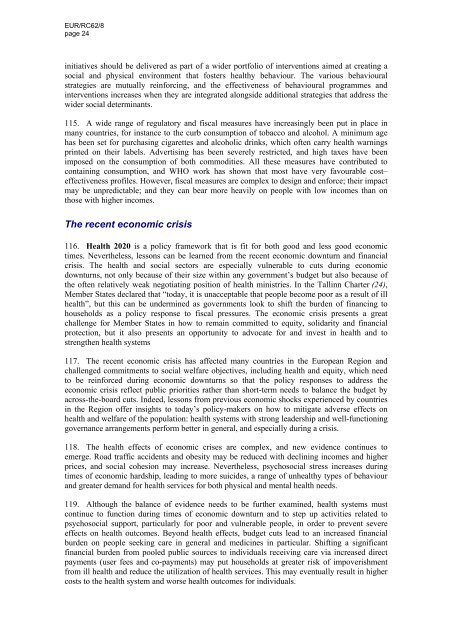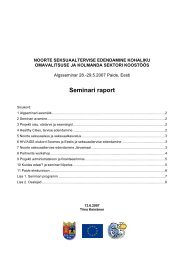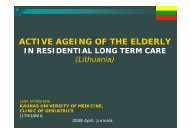EUR/RC62/wd08 (Eng) - WHO/Europe - World Health Organization
EUR/RC62/wd08 (Eng) - WHO/Europe - World Health Organization
EUR/RC62/wd08 (Eng) - WHO/Europe - World Health Organization
Create successful ePaper yourself
Turn your PDF publications into a flip-book with our unique Google optimized e-Paper software.
<strong>EUR</strong>/<strong>RC62</strong>/8<br />
page 24<br />
initiatives should be delivered as part of a wider portfolio of interventions aimed at creating a<br />
social and physical environment that fosters healthy behaviour. The various behavioural<br />
strategies are mutually reinforcing, and the effectiveness of behavioural programmes and<br />
interventions increases when they are integrated alongside additional strategies that address the<br />
wider social determinants.<br />
115. A wide range of regulatory and fiscal measures have increasingly been put in place in<br />
many countries, for instance to the curb consumption of tobacco and alcohol. A minimum age<br />
has been set for purchasing cigarettes and alcoholic drinks, which often carry health warnings<br />
printed on their labels. Advertising has been severely restricted, and high taxes have been<br />
imposed on the consumption of both commodities. All these measures have contributed to<br />
containing consumption, and <strong>WHO</strong> work has shown that most have very favourable cost–<br />
effectiveness profiles. However, fiscal measures are complex to design and enforce; their impact<br />
may be unpredictable; and they can bear more heavily on people with low incomes than on<br />
those with higher incomes.<br />
The recent economic crisis<br />
116. <strong>Health</strong> 2020 is a policy framework that is fit for both good and less good economic<br />
times. Nevertheless, lessons can be learned from the recent economic downturn and financial<br />
crisis. The health and social sectors are especially vulnerable to cuts during economic<br />
downturns, not only because of their size within any government’s budget but also because of<br />
the often relatively weak negotiating position of health ministries. In the Tallinn Charter (24),<br />
Member States declared that “today, it is unacceptable that people become poor as a result of ill<br />
health”, but this can be undermined as governments look to shift the burden of financing to<br />
households as a policy response to fiscal pressures. The economic crisis presents a great<br />
challenge for Member States in how to remain committed to equity, solidarity and financial<br />
protection, but it also presents an opportunity to advocate for and invest in health and to<br />
strengthen health systems<br />
117. The recent economic crisis has affected many countries in the <strong>Europe</strong>an Region and<br />
challenged commitments to social welfare objectives, including health and equity, which need<br />
to be reinforced during economic downturns so that the policy responses to address the<br />
economic crisis reflect public priorities rather than short-term needs to balance the budget by<br />
across-the-board cuts. Indeed, lessons from previous economic shocks experienced by countries<br />
in the Region offer insights to today’s policy-makers on how to mitigate adverse effects on<br />
health and welfare of the population: health systems with strong leadership and well-functioning<br />
governance arrangements perform better in general, and especially during a crisis.<br />
118. The health effects of economic crises are complex, and new evidence continues to<br />
emerge. Road traffic accidents and obesity may be reduced with declining incomes and higher<br />
prices, and social cohesion may increase. Nevertheless, psychosocial stress increases during<br />
times of economic hardship, leading to more suicides, a range of unhealthy types of behaviour<br />
and greater demand for health services for both physical and mental health needs.<br />
119. Although the balance of evidence needs to be further examined, health systems must<br />
continue to function during times of economic downturn and to step up activities related to<br />
psychosocial support, particularly for poor and vulnerable people, in order to prevent severe<br />
effects on health outcomes. Beyond health effects, budget cuts lead to an increased financial<br />
burden on people seeking care in general and medicines in particular. Shifting a significant<br />
financial burden from pooled public sources to individuals receiving care via increased direct<br />
payments (user fees and co-payments) may put households at greater risk of impoverishment<br />
from ill health and reduce the utilization of health services. This may eventually result in higher<br />
costs to the health system and worse health outcomes for individuals.









